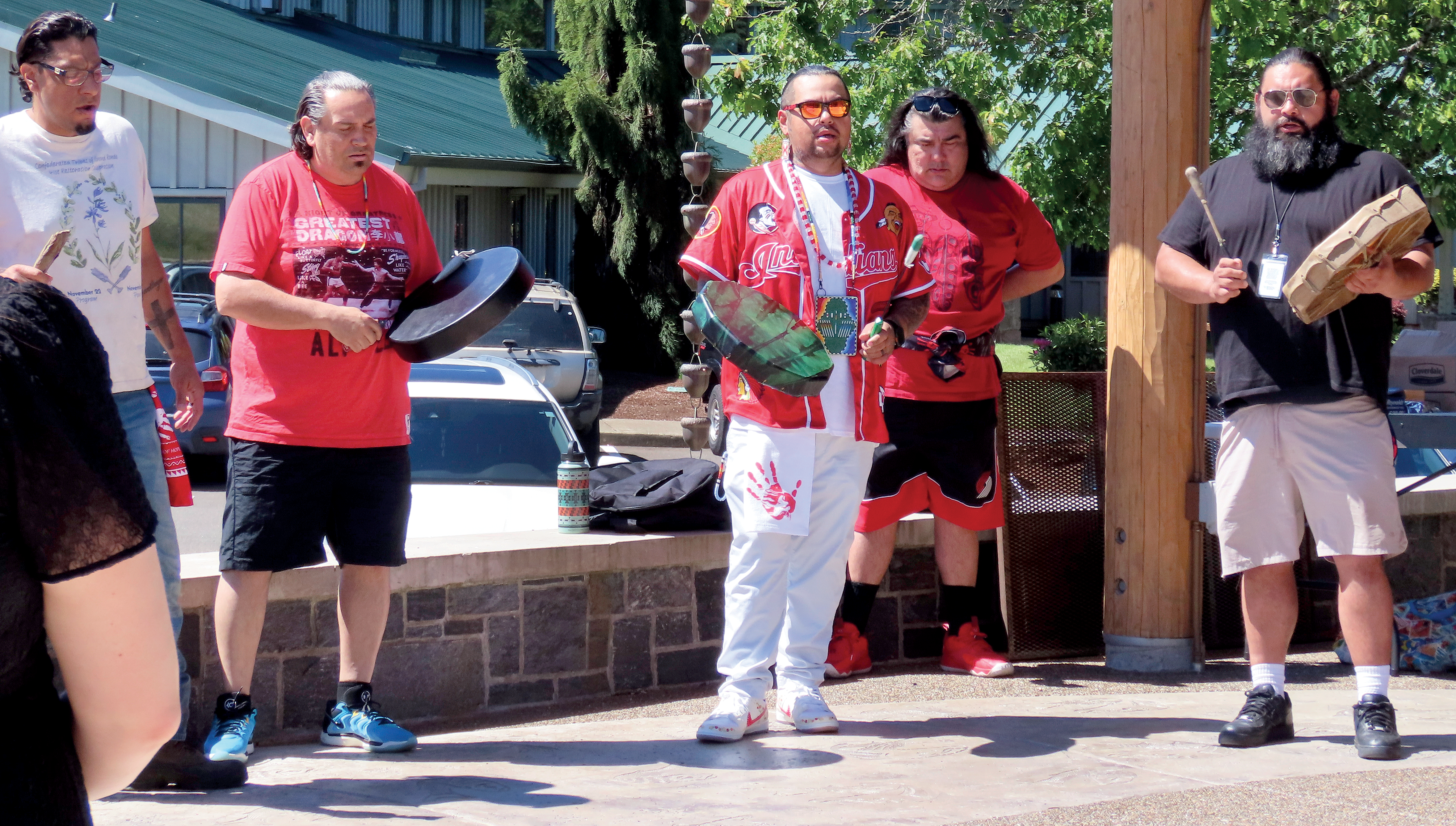Tribal Government & News
Cooking burgers, raising awareness for MMIP

By Nicole Montesano
Smoke Signals staff writer
Sunshine, singing, drumming and a burger and hot dog barbecue prepared by members of the Grand Ronde Tribal Police Department, combined to draw employees from across the campus to the Cheryle A. Kennedy Public Health Building on Friday, May 30.
There was a serious purpose behind the festivity, however.
The Tribe’s Warriors of Hope Domestic & Sexual Violence Program spent the time raising awareness about missing and murdered Indigenous people, as well as providing information about domestic violence programs and how to access resources.
A display of red shawls, dresses and T-shirts were located onsite, each garment commemorating a person lost to murder or who is still missing, including Heather Leann Haller Cameron, a Grand Ronde Tribal member who disappeared in Shasta County in August 2012.
Signs listed facts and statistics about the ongoing issue of violence against Indigenous people, especially women and girls.
Approximately130 or more people attended the event; so many that by two hours in, organizers had run out of burgers and hot dogs.
Warriors of Hope Program Manager Cassie Dandy said the event seemed to be popular.
“We saw so many smiles and heard lots of laughter during this event,” she said. “We wanted to bring our community together to engage and connect. We were successful! We’ve had lots of asks to do it again.”
Tribal members Ferrell DeGarmo and Fabian Quenelle sang honor songs and played drums while a shell of smudging sage was handed around. DeGarmo also gave the invocation.
Dandy explained that the event “is to bring awareness to the community and also to honor our lost and still-missing loved ones and relatives.”
To help those still trapped in unsafe situations, Warriors of Hope invited representatives from the Salem-based Center for Hope & Safety and the Oregon Department of Human Services to staff informational tables.
The Center for Hope & Safety, whose motto is “because everyone deserves a life free of violence,” offers a 24-hour crisis line in English, Spanish and more than 100 other languages, at 503-399-7722. It serves survivors of domestic violence, sexual assault, stalking and human trafficking.
It also offers an emergency shelter, with a Safe Paws program that enables survivors to bring their pets to safety when they flee, as abusers often threaten, harm or kill pets left behind.
The center, formerly the Mid-Valley Women’s Crisis Service is open from 9 a.m. to 5 p.m. Monday through Friday at 605 Center Street in Salem. It offers information, referral services, advocacy, safety planning, 911 cell phones, computers survivors can use for work and housing searches, court and immigration advocacy, and community outreach services.
For more information, call 503-378-1572, visit the website at www.hopeandsafety.org or email info@hopeandsafety.org.
The DHS table offered information on the Supplemental Nutrition Assistance Program and the Double Up Food Bucks program that enables SNAP recipients to receive up to $20 in extra benefits for shopping at participating farmers markets, grocery stores and farm shares. There was also information on places to obtain food and applications for services.
More information about Oregon food programs is available online at www.oregon.gov/odhs/food.
Tribal Native Plant Nursery Assistant and Tribal member Joseph Ham staffed a table offering camas starts to passersby.
“We were gifted these camas bulbs from the Northwest Oregon Restoration Partnership,” Ham said. “They collected them from coastal areas and gave 1,000 to the Siletz Tribe and almost that many to us. We wanted to gift them to the community. It’s nice, because these are … pretty local.”
Quenelle said he performs at similar events across northwest Oregon.
“For me it’s about being able to create a safe space anywhere that I’m at,” he said. “I was taught when we grew up that we’re the warriors of the Tribe. But the ideology of the warrior has shifted. People think they need to be the fighters, bring on that violence. But the real meaning is to create a safe space for anyone in the Tribe. Men, women, children, Elders. So anytime there’s an event and a chance to stand up and be that safe space, I’m in.”
